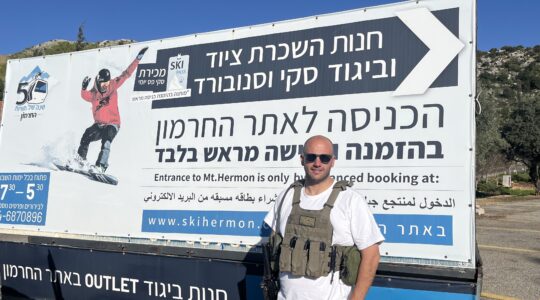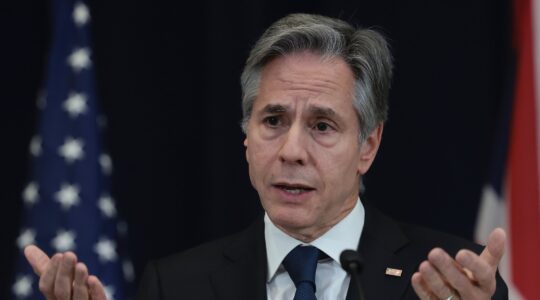EREZ CROSSING, Israel (JTA) – “Free Alan!” journalists chanted on both sides of the Gaza Strip border more than a month since BBC reporter Alan Johnston was kidnapped by gunmen on a Gaza street. He has not been heard from since. Since that time, most foreign reporters have refrained from entering Gaza, fearful of meeting a similar fate. As foreign correspondents on April 25 stood protesting along the Israeli side of the sand-swept border in the name of their colleague, many lamented that the risks of reporting from Gaza were keeping them – and the world – from closely covering a major conflict zone. “We need to go to Gaza,” said Simon McGregor-Wood, ABC’s Jerusalem bureau chief. “We need to be able to cover this important story, to understand what’s going on and to tell its people’s stories. We need the kidnappings to stop. But first we must have Alan back, safe and sound, today.” At a recent meeting of the Foreign Press Association, the organization of locally based foreign correspondents that McGregor-Wood chairs, not one hand went up when members were asked if they were still traveling to Gaza. “It means we as foreign correspondents are no longer seeing for ourselves what is going on there,” McGregor-Wood said.The few journalists who still might venture in are reporting under Palestinian police protection. But most are relying on second-hand reports from Palestinian journalists who live in Gaza. Even as coverage drops, Gaza continues to slide into chaos. Its political landscape is increasingly fractured, with violent rivalries spreading not just between traditional adversaries but also within existing factions of the present and past ruling parties themselves, Hamas and Fatah. “The thing about Gaza is that whatever is going on there, you can see it,” said Ken Ellingwood, a Los Angeles Times reporter who has covered the region for three-and-a-half years. “Whether it’s which factions are out there with their guns, they’re visible. You can feel the increase in militancy. When the government is collapsing or failing, you can see the trash piling up. “During times of Israeli incursions you could go and talk to people, go and watch it,” he said. “One of the terrible results of this now is that it is much more difficult to come and spend time doing the poking around that you need.” Ellingwood said the world misses out on having the situation in Gaza described through the trained eyes of journalists who know the area.”The Palestinians really lose out because they want their story to be told and often view as their best weapons the world’s attention to their problems – and now the world cannot see as much,” he said. Johnston, 44, was the only foreign correspondent living full-time in Gaza, and was nearing the end of a three-year assignment there when he was kidnapped March 12.Contradictory rumors have circulated since, some claiming that he is fine and others that he has been killed. Who is holding Johnston and what their demands remain unclear. “Now Alan’s reporting voice has been silenced. Everyone suffers for that,” Jonathan Baker, deputy head of news gathering for BBC News, said during the demonstration.Like other media executives, Baker said no BBC staff was being sent into Gaza since Johnston’s kidnapping. In a statement to the media, Baker addressed Johnston’s captors, telling them to set him free immediately. “His only offense was to expose himself to personal danger because of a strong desire to bring the story of Gaza to the outside world,” he said. More than a dozen foreign journalists and aid workers have been abducted in Gaza in the past year, but all were released unharmed, usually within hours or days. Kidnappers reportedly
demanded jobs or money for releasing their captives. The journalists kept longest were a Fox News reporter and cameraman who were held for two weeks in August. Gaza, which is small and compact, can be especially treacherous terrain for foreign correspondents now that militant groups reportedly are on the lookout for foreign captives. There is only one road in and one road out, and foreigners frequent a mere handful of hotels. Add to that, word travels fast of a foreigner’s whereabouts. Tim Butcher, the Daily Telegraph’s Middle East correspondent, said that before the kidnapping he would come to Gaza about twice a month – and sometimes more often, depending on the news. He has not returned since Johnston was captured. “The risks outweigh the benefits,” he said. “It’s sad how our coverage will be affected, but it makes more sense to be working and safe in Jerusalem than kidnapped and not able to work in Gaza.”
Journalists rally for colleague
Advertisement





